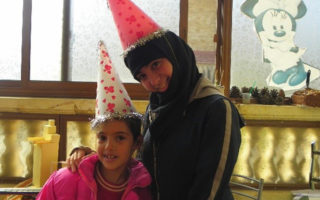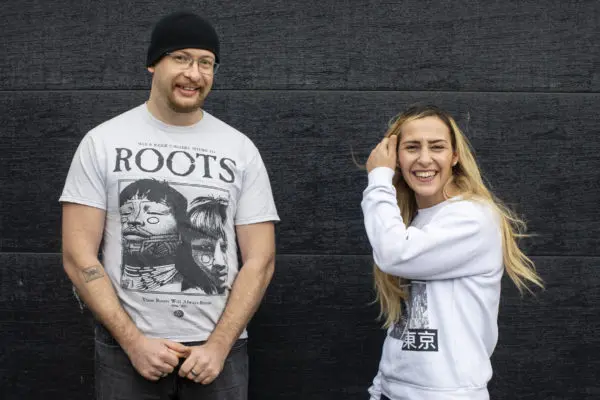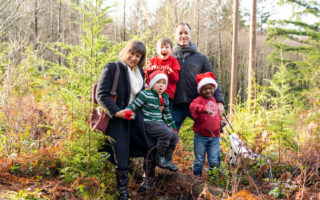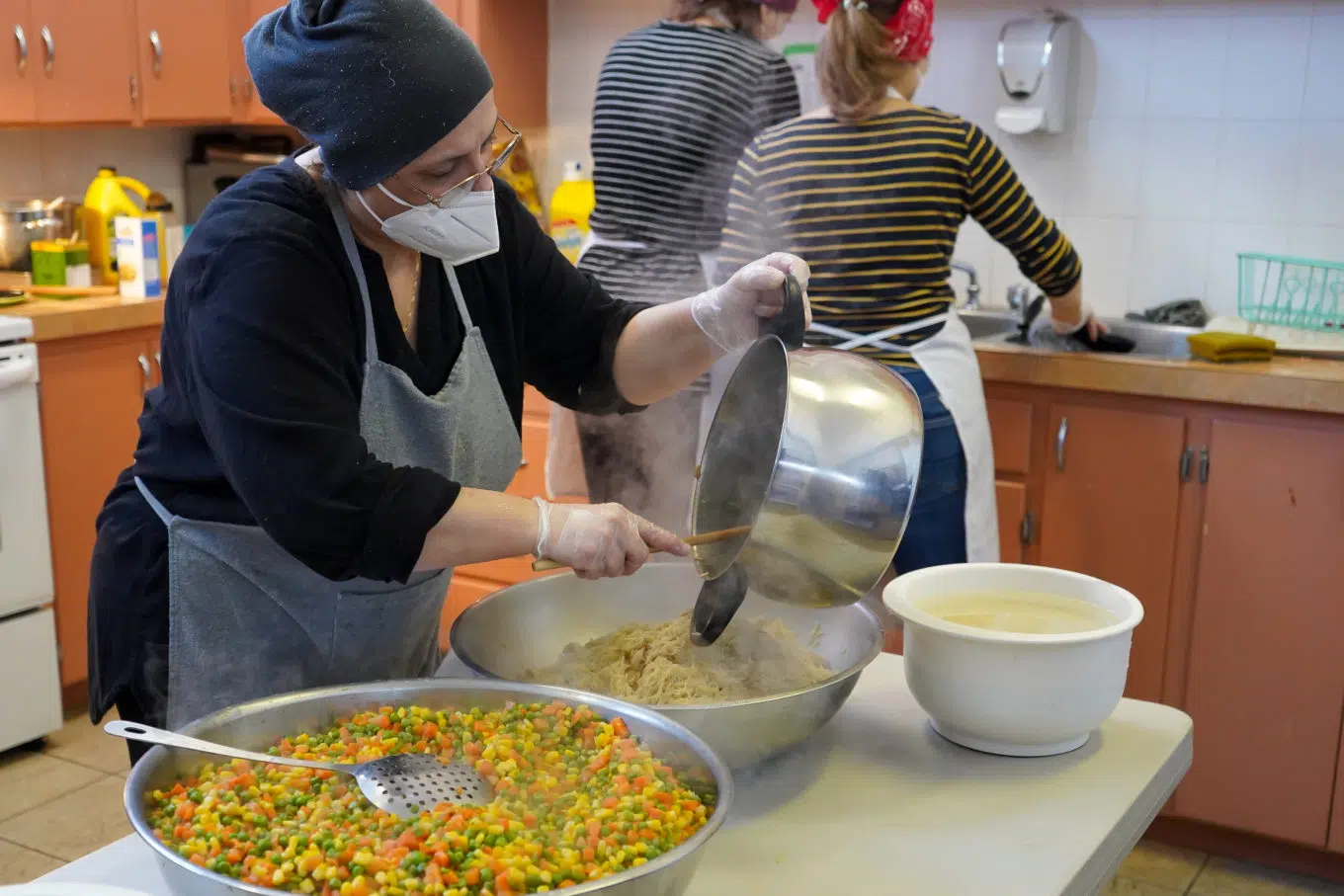
Iman prepares a delicious meal for the Parkdale Food Centre in Ottawa, ON. © UNHCR/Soo-Jung Kim
Catering business uses food to empower Syrian refugee women in Canada and help with their integration
By Yasmine Saker
When Ayda Alnoofoori and her two daughters arrived in Ottawa, Canada, back in 2015, she brought with her much more than the few suitcases that contained their lives and memories of Syria. She also carried tastes from home that she would come to share with Canadians, one Syrian specialty at a time.
Ayda and her family fled their home in Syria’s capital, Damascus, in 2012, amidst a deteriorating security situation, increasing violence and a severe lack of services. After over three years in Lebanon, Ayda and her daughters were resettled to Canada, sponsored by the Ottawa Centre for Refugee Action (OCRA), a grassroots group of volunteers working together to support refugees settle into their new communities.
“We were the first family to arrive through OCRA,” recalls Ayda, now 60, who spent the long flight contemplating every small detail of their new lives that were about to begin.
“When that plane landed, we were met by OCRA volunteers at the airport, and I knew I had nothing to worry about. They supported us with everything from language to transportation, grocery shopping, and getting to know our new community,” she adds.
“Like many Canadians, I was stunned by the images of Syrian refugees fleeing their homes and so I started looking for ways to help.”
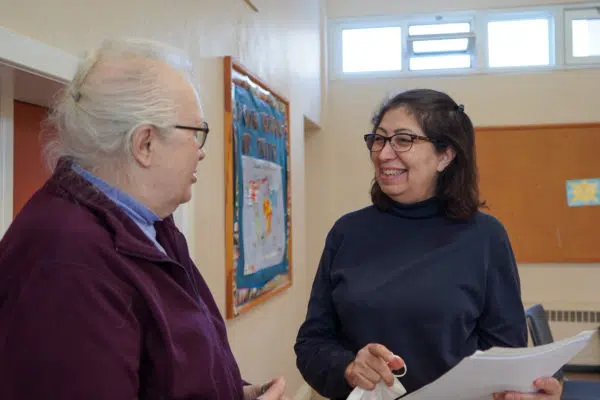
Karen Hill (left) and Ayda Alnoofoori (right) join forces to start Yasmin Syrian Kitchen. © UNHCR/Soo-Jung Kim
One of the volunteers at OCRA was Karen Hill, a retired public policy analyst with long experience in volunteering and starting organizations, who would become Ayda’s neighbour, close friend, and business partner. An immigrant herself, Karen has made it a personal mission to support other people and newcomers to Canada.
“Like many Canadians, I was stunned by the images of Syrian refugees fleeing their homes,” says Karen, now 76. “And so, I started looking for ways to help,”.
While working together at a summer camp for newcomer families organized by the Glebe Neighbourhood Activities Group, Ayda and Karen got the idea to start a catering business specializing in Syrian cuisine and employing Syrian refugee women.
This is how Yasmin Syrian Cooking was born.
“At the camp, I saw women who were bored at home while their children went to school, and their husbands were out trying to make a living. Most of them struggled with their English, had no work experience back home or a degree they could use to get a job,” recalls Ayda who has extensive experience volunteering in women empowerment projects.
“I asked myself: ‘What is something they all know how to do that can help them connect with Canadians?’ ‘Cooking!’” she says, with a big smile on her face.
“Food is a very important aspect of culture. When you want to connect socially, you gather over food.”
Less than a year after Ayda’s arrival in Canada, Yasmin Syrian Cooking started. Named after the white aromatic Jasmine flower, found in Damascus, Yasmin aims to help refugee women generate some income, give them a chance to meet new people, and introduce Canadians to the Syrian cuisine.
“Food is a very important aspect of culture. When you want to connect socially, you gather over food. When you move to a new country, it is inevitable that you miss the foods you enjoyed back home, but you also get to know the food specialties of your new home,” explains Ayda, who is Yasmin’s food manager.
And so, it was Yalanji, grape leaves stuffed with rice, and Freekeh, a delicious grain cooked with meat or chicken, that brought eight Syria-born women who came to Canada as refugees from Lebanon, Jordan, Turkey, and Egypt, together with Ayda and Karen, to cook in Yasmin’s kitchen for the first time.
Operating from a church kitchen in Ottawa, Yasmin was quickly growing their list of clients that included non-governmental organizations, corporations, and private families who wanted to serve Syrian food at their events. But when the COVID-19 pandemic started and resulting restrictions were implemented, Yasmin took a hit.
“You have to keep in mind, we’re a business, not a charity. We’re not funded by the government or anyone else, and so we thought long and hard of shutting down our business,” says Karen, who is the volunteering business manager at Yasmin.
“It was the women working with us who pushed us to keep going,” she adds.
And so, Yasmin started cooking for two food centres in Ottawa, preparing over 600 meals per week and managing to stay afloat. Now that restrictions are easing, business seems to be slowly picking up and Yasmin is gradually returning to catering events.
“We have done everything from private dinners to weddings to business meetings,” says Karen. “It’s always a pleasure being part of people’s happy moments.”
This sense of community runs through the kitchen at Yasmin.
“I don’t exaggerate when I say that we have truly become a family at Yasmin. We cook with love, like we’re making food for our own families.”
Nada, 50, one of the Syrian women working at Yasmin who came to Canada as a refugee through Lebanon back in 2016, is an art graduate and a talented painter. At Yasmin, she found a new way to introduce her culture to her new community, the culinary art.
“I don’t exaggerate when I say that we have truly become a family at Yasmin,” says Nada. “We cook with love, like we’re making food for our own families.”
Aside from a delicious menu offering a variety of Syrian specialties, Yasmin also offers cooking classes that culminate in a Syrian potluck dinner, cooked by the participants using Ayda’s recipes and techniques.
“I try to be specific when measuring ingredients instead of a ‘pinch’ here and there, but it doesn’t always work out,” says Ayda with a giggle. “One of the participants in my cooking classes came up with a new measurement, an Ayda spoon, which is neither a tea nor a tablespoon,” she adds lightheartedly.
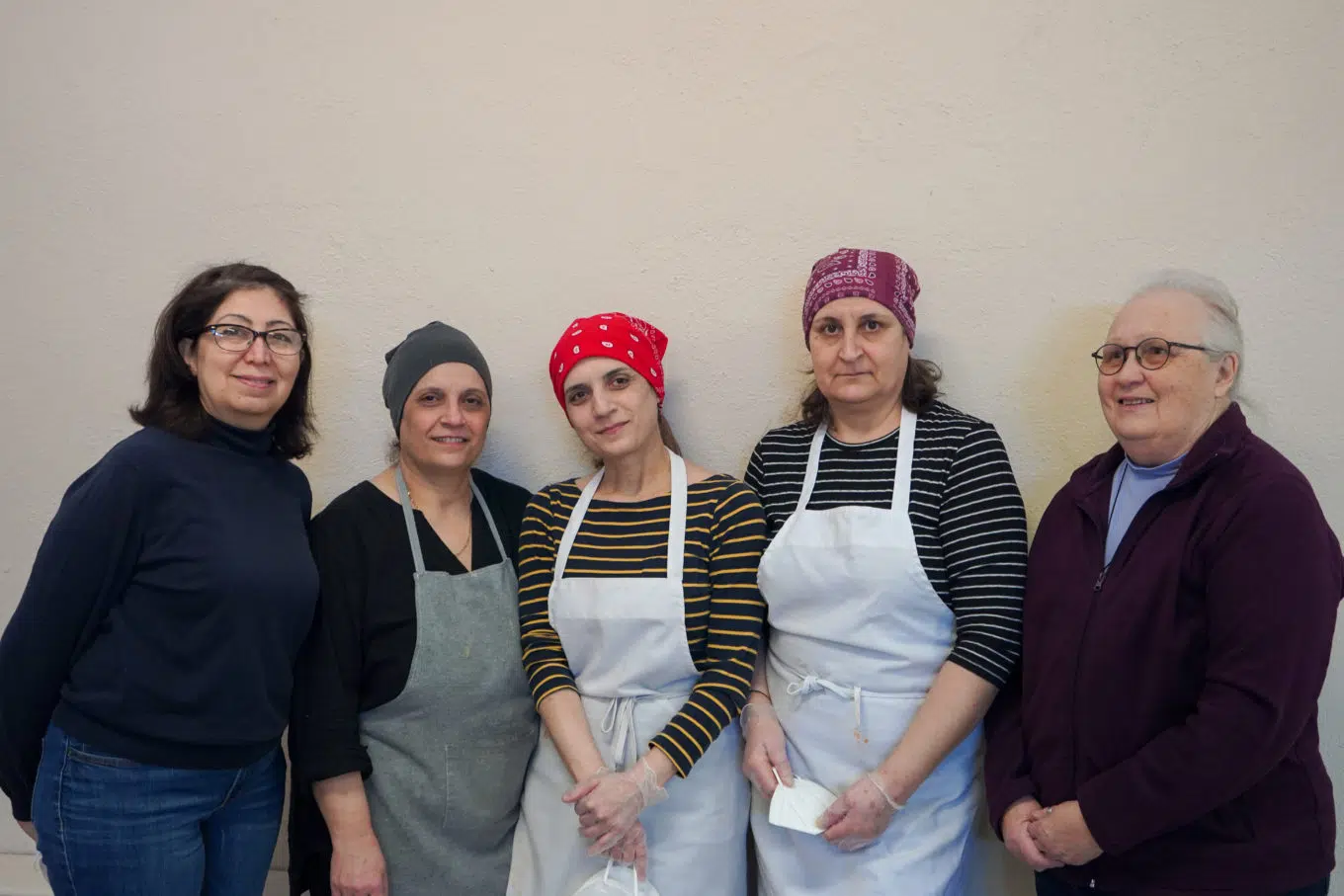
From left to right: Ayda, Iman, Nada, Marie and Karen. © UNHCR/Soo-Jung Kim
“One of the joys of my day is sitting here doing some paperwork for Yasmin, while the ladies are in the kitchen laughing, singing and dancing while they cook,” says Karen. “It makes me so happy. I’ve done a lot of businesses before, but you can’t have a business like this without Ayda and this beautiful team.”
11 years into an unrelenting conflict in Syria, the Syrian refugee crisis continues to be the world’s largest, with over 5.6 million refugees in neighbouring counties, and another 1 million dispersed around the world. Canada is considered a global leader in resettlement and has welcomed over 73,000 Syrian refugees to start their lives in 350 communities across Canada. However, due to the lack of resettlement places globally, vulnerable refugees remain in host countries for long periods.
UNHCR is on the ground inside Syria and in neighbouring host countries, providing life-saving humanitarian assistance to over 6.9 million internally displaced people who remain inside the country, and over 5.6 million refugees in neighbouring host countries. Over a decade of conflict has seen needs increase, including for shelter, education, healthcare, and winter assistance. You can help us make a difference by donating here.



